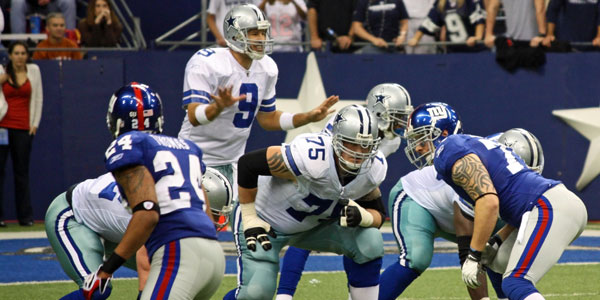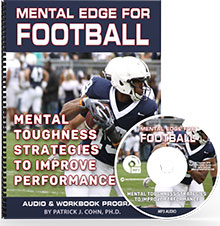
Maintaining Composure Under Pressure
“Why do I always choke under pressure?” Have you had similar thoughts during your career or a game?
Fear of choking causes choking. For example, when you worry about choking, you put more pressure on yourself to make big plays. When the game is on the line, pressure increases further, making the game more challenging to play.
Increased pressure leads to uncharacteristic mistakes, lapses of focus, poor decision-making, and the inability to react quickly.
In essence, the moment becomes TOO big or important!
Some players feel they don’t have what it takes to deal with pressure. When you think you can’t handle the pressure, you will fall apart in big-game moments. However, pressure is something we do to ourselves. Your perception of a situation causes the level of pressure you experience
For example, if you view a goal-line stand as just another play, you will experience less pressure than if you consider the down as the play that will decide the game.
Coping with pressure is a mental skill. Mental skills can be learned, developed, and honed, just like physical skills.
When you first started playing football, throwing a ball was awkward and difficult. As you kept working on the physical skill of throwing the ball, you became more proficient and accurate. Eventually, you could depend on this skill in games.
Mental skills develop in the same manner.
You can learn how to deal with pressure in several ways: practicing performing under pressure, visualizing playing under adverse circumstances, or working with a Mental Game Coach to learn how to cope. In other words, practice makes proficient.
You developed confidence in performing this skill in a wide range of game situations by honing a skill.
New York Jets quarterback Mike White, 26, started his first game as a pro, leading New York to a 34-31 victory over the Cincinnati Bengals. The key to White’s success was managing the pressure of the situation.
White completed 37 of 45 attempts for three touchdowns and 405 yards to overcome an 11-point, fourth-quarter deficit.
Many variables could have increased pressure for White:
- The Jets were 1-4 heading into the game
- White was replacing injured franchise quarterback Zach Wilson, the second overall pick in the 2021 NFL Draft.
- White threw two first-half interceptions
- The Jets were trailing 11-points in the fourth quarter
- The start was White’s first after being cut five times in his NFL career instead, White kept the game in perspective.
WHITE: “Personally, I did a good job of not making it more than it is. What helped a lot, too, was the coaches’ faith in me and the team’s faith in me. There wasn’t a flinch.”
Since you can increase the pressure you feel by making the moment bigger than it is, you also have the power to manage pressure by shifting your perspective.
The mental skill of managing pressure is a tremendous tool to take your game to the next level.
How to Manage Pressure in Games
Outcome thinking and high expectations leads to feeling more pressure..
You can manage pressure by focusing on your job for each play. Instead of fearing a mistake or a possible negative outcome, think about what your job is at the moment. Try not to get ahead of yourself.
Avoid labeling some plays as important plays, like 3rd down situations. Treat each play with equal importance instead of worrying about the need to get the first down or getting to a 4th down situation on D.
Related Sports Psychology Articles
- The Mindset for Readiness in Sports
- Leadership Mindset and Qualities for a Football Team
- Practice Mindset Matters to Improve Performance
*Subscribe to The Sports Psychology Podcast on iTunes
*Subscribe to The Sports Psychology Podcast on Spotify
Download a free sports psychology report to improve your mental game!
Learn more about our one-on-one mental game coaching.
The Mental Edge for Football

Are you (or your athletes) performing inconsistently in games with less confidence in games than in practice? Do you lose confidence easily after a couple of blown plays? Do you become so frustrated with your game that you can’t focus on the next play? If you answered yes to these questions, it’s a good bet that your mental game might prevent you from consistent performance in games.
“The Mental Edge For Football” is a complete brain dump of the TOP eight mental training sessions we teach our football players to help them boost their mental game and improve consistency – from how to mentally prepare for games to performing under pressure to building unstoppable confidence.